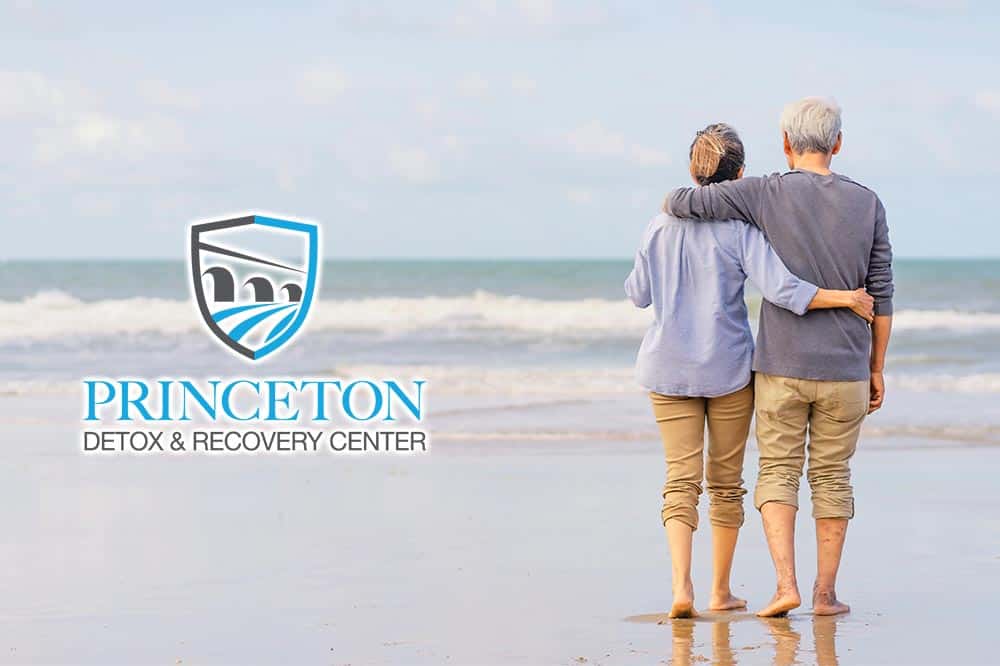Identifying Addiction
Is My Spouse an Addict?
Recently, you have noticed your spouse has been acting out of character. Maybe they have been isolating more often than normal, and they seem to be pushing you and their other loved ones away. Maybe they are avoiding activities they used to enjoy, or sleeping strange hours and coming home later after work. Whatever the case may be, you have noticed something is definitely amiss. You start to suspect your spouse might actually be struggling with drug or alcohol addiction. But how can you be sure? At Princeton Detox & Recovery Center we know just how painful it can be to watch a loved one struggle with a substance use disorder. You might be afraid to confront your spouse for fear of pushing them even farther away, or making them angry and getting into a full-fledged fight. We are available to help walk you through the process of helping a loved one who has been struggling with addiction. There are steps you can take to help — continue reading to learn more, or reach out to us directly over the phone or through our website and we will answer any additional questions you might have.
How Can You Tell if Your Spouse is Experiencing Drug & Alcohol Addiction?
How can you tell if your spouse is struggling with drug or alcohol addiction or if they’re simply going through a slump? As human beings, we experience a series of emotional highs and lows — no one is happy, fun-loving and fully engaged all of the time. However, if your spouse has been acting out of character for a prolonged period of time and you have a sneaking suspicion something else might be the root cause, there is no harm in taking extra steps to be sure. There are several ways to tell if your spouse is experiencing drug or alcohol addiction. You can look for physical, emotional and behavioral warning signs. You can keep an eye out for drug and alcohol paraphernalia, which might be hidden throughout your house. We have compiled a list of ways to tell whether or not your spouse is struggling with addiction, and if you have any additional questions regarding this subject (or any other addiction or recovery-related subjects) we are happy to help. Contact us today to learn more.
Physical Signs of Addiction
One of the best ways to tell whether or not your spouse is struggling with substance use is by keeping an eye out for the physical signs and symptoms of addiction. The physical signs vary depending on what type of substance is being used. For example, someone who has been struggling with alcohol misuse will act very differently from someone who has been misusing a prescription stimulant. It is important to note some people are able to hide their substance use extremely well. They might carry out their day-to-day tasks as normal and successfully hide their addiction for a prolonged period of time. If you don’t notice any physical signs right away, it does not necessarily mean there is no addictive disorder present. Behavioral and emotional signs are also a good indication of a substance use disorder. Contact us today to learn more about this distinction, or to learn more about which physical warning signs to look for.
We Are Here For You
Let Us Help You Heal
Our Drug & Alcohol detoxification experience is second to none.
Learn how we can help by speaking with one of our Treatment Advisors today.
Physical Signs of Alcohol Use Disorder
It can sometimes be difficult to tell if a spouse has been drinking excessively, especially if they already drink on a regular basis. If your spouse has been struggling with an alcohol use disorder, they might exhibit the following physical symptoms:
- Uncontrollable shaking or trembling/shaky hands.
- Flushing of the face/redness in the cheeks and nose.
- Regularly smelling like alcohol/smelling alcohol on the breath.
- Confusion and disorientation.
- A lack of coordination.
- Gastrointestinal issues like nausea and vomiting.
- Cold and clammy skin/low body temperature.
- Noticeable weight loss or weight gain.
- Red, bloodshot or watery eyes.
Physical Signs of Opioid Use Disorder
Opioid use disorders can involve prescription painkillers like oxycodone, hydrocodone or codeine, or illegal opioids like heroin. Rates of fentanyl abuse have also been on the rise (fentanyl is a synthetic opioid known for being between 80 and 100 times more potent than morphine). If your spouse has been struggling with an opioid use disorder, they might exhibit the following physical symptoms:
- Appearing tired and drowsy throughout the day.
- Sleeping strange hours.
- Reduced appetite which can lead to noticeable weight loss.
- A lack of attention paid to personal appearance/personal hygiene.
- The presence of flu-like symptoms (runny nose, watery eyes, upset stomach, profuse sweating and body aches).
- Nausea, vomiting and constipation.
- Small pupils.
- Slurred speech/compromise cognitive functioning.
Physical Signs of Benzodiazepine Use Disorder
Benzodiazepines include medications like Xanax, Klonopin and Valium, which are commonly prescribed for the treatment of moderate or severe anxiety or sleep disorders. If your spouse has been struggling with a benzodiazepine use disorder, they might exhibit the following physical symptoms:
- Excessive drowsiness/changes to sleeping patterns.
- Unsteadiness/inability to stand up straight.
- Persistent headaches.
- Dizziness and light-headedness which can lead to fainting.
- Muscle weakness.
Physical Signs of Stimulant Use Disorder
Stimulant drugs include prescription stimulants like Adderall and Ritalin and illegal stimulants like cocaine and methamphetamine. If your spouse has been struggling with a stimulant use disorder, they might exhibit the following physical symptoms:
- Increased physical activity.
- Restless/an inability to sit still.
- Trouble falling asleep at night and other changes to sleeping patterns.
- Loss of appetite which can lead to significant weight loss.
- Appearing nervous or jittery.
- Elevated heart rate and increased blood pressure.

Emotional & Behavioral Signs of Addiction
A person who has been struggling with substance use will also exhibit emotional and behavioral signs. These signs also vary on a person-to-person basis, though there are often some similarities across the board. If you believe your spouse might be struggling with a drug or alcohol addiction, keep an eye out for:
- Obvious changes to mood and demeanor.
- A loss of interest in activities which were previously enjoyed.
- Isolation from friends and family/more time spent alone.
- Defensiveness when substance use is brought up in conversation.
- Increased or newly developing symptoms of anxiety and/or depression.
- Changes to sleeping and eating patterns.
- Experiencing problems at work or at school.
- Missing out on personal obligations or important engagements.
- Experiencing issues in interpersonal relationships.
- Decreased motivation.
- Legal and financial problems directly related to substance use.
If you have noticed a combination of physical, emotional and behavioral warning signs, it is a good idea to reach out for guidance on which steps to take next. At Princeton Detox & Recovery Center we have ample experience helping the loved ones of those who have been struggling with addiction. Many of our staff members have helped their own loved ones through the recovery process, allowing them to come from a place of experience, understanding and compassion. Contact us today to learn more about which steps to take.
Paraphernalia Can Be a Sign of Addiction
If you believe your spouse has been struggling with a substance use disorder, it is a good idea to be on the lookout for certain types of paraphernalia. If paraphernalia is being used you might find it stashed away in personal belongings or hidden throughout the house; in bedside table drawers, bathroom cabinets or in the back of closets. If you do find a piece of drug or alcohol paraphernalia, avoid confronting your spouse right away. Instead, reach out to a professional for advice on what steps to take next.
Ready To Begin Your Detox?
Don’t let addiction control your life.
Call us today and let’s get you started on the path to a better you.
Alcohol Use Disorder Paraphernalia
If your spouse has been struggling with an alcohol use disorder, you might find the following pieces of paraphernalia:
- Empty bottles (liquor, wine or beer) or cans stashed in trash cans and in other “hiding places” throughout the house.
- Empty alcohol containers in brown paper bags.
- Water bottles or soda bottles that either smell like alcohol or contain alcohol.
Opioid Use Disorder Paraphernalia
If your spouse has been struggling with an opioid use disorder, you might find the following pieces of paraphernalia:
- Multiple pill bottles (in the case of prescription painkiller misuse).
- Strange pills hidden throughout personal belongings — a painkiller identification tool can be found here.
- Pill residue (if painkillers are being crushed and snorted or injected).
- Needles or syringes, burnt spoons, rubber tourniquets, torn up and stained cotton balls and small plastic bags or folded pieces of saran wrap.
Benzodiazepine Use Disorder Paraphernalia
If your spouse has been struggling with a benzodiazepine use disorder, you might find the following pieces of paraphernalia:
- Multiple prescriptions for medications like Xanax, Klonopin or Valium.
- Random pills hidden in personal belongings.
- Pill residue if benzodiazepines are being crushed and snorted.
Stimulant Use Disorder Paraphernalia
If your spouse has been struggling with a stimulant use disorder, you might find the following pieces of paraphernalia:
- Prescription pill bottles, random pills hidden throughout personal belongings.
- Small glass pipes (used for smoking methamphetamine or crack cocaine).
- Burnt pieces of tin foil and cigarette lighters.
- Small plastic bags containing a powdered substance (cocaine).
- Rolled up dollar bills, straw fragments and white, powdery residue.
How to Help a Spouse With Addiction
If you have noticed warning signs and seen paraphernalia, you might be wondering what steps to take next. How can you help your spouse if they are clearly struggling with addiction? At Princeton Detox & Recovery Center, we recommend educating yourself on addiction first and foremost. This will help you come from a place of compassion and understanding rather than frustration. Approaching the matter with a calm, collected and sympathetic attitude will increase the likelihood of your spouse seeking professional help. We recommend taking the following steps when dealing with an addicted spouse:
- Get Informed – Knowing what signs and symptoms to keep an eye out for is a great place to start. Next, educate yourself even further on addiction. What are the best treatment options? Is inpatient rehab the best level of care for your spouse? You are welcome to contact us directly with any questions you might have. We will help you determine which level of care is the most appropriate.
- Have a Conversation – Set up a time to sit down with your spouse and have a calm and non-accusatory conversation. Be sure your spouse is completely sober at the time, and address your concerns in a neutral environment (we recommend a coffee shop, seeing as being in public helps prevent escalation). Because people who struggle with addiction often experience some degree of denial, be prepared for the conversation to end abruptly. At the very least an important seed has been planted.
- Present Treatment Options – If your spouse does agree to have a conversation it is a good idea to present potential treatment options. Rather than bombarding them with possibilities, find one or two detox and treatment centers in your area and give them the name and website so they can do some research of their own.
- Take Care of Your Own Needs – Watching someone you care for struggle with addiction will do a number on your own mental and emotional well-being. We suggest attending a support group like Al-Anon or seeing an individual therapist with a personal background in substance use.
- Stage an Intervention if Necessary – If your loved one is a direct threat to themselves or other people, a professionally staged intervention is likely a good idea. For example, say your loved one has already overdosed on heroin more than once, or they regularly get behind the wheel of a car while intoxicated with your children in tow. When you suggest recovery, they scoff and grow defensive. In cases like these a staged intervention can prove extremely beneficial.
- Prepare for Any Outcome – A one-on-one conversation and a professionally staged intervention might not have the ideal outcome straight away. However, once the seed is planted the likelihood of your spouse reaching out for help eventually increases significantly.
Contact Us Today to Learn More
If you are interested in learning more about how to help a loved one who has been struggling with addiction, Princeton Detox & Recovery Center is available to walk you through the process. We have developed an admission process which is simple, straightforward and can be completed in roughly 15 minutes. Once you or your loved one contacts us, either over the phone or directly through our website, they will be put in touch with one of our experienced Treatment Advisors. We provide a brief pre-assessment to ensure our program is the best fit, and we offer a free, no obligation insurance benefit check for those who are currently insured through a major regional or national provider. We then organize local transportation to our New Jersey detox center. Contact us today to begin.

Reviewed for accuracy by:
Amanda Hilzer M.Ed, CAADC, IADAC, ICCS, LCADC, CCS
Amanda graduated from Lehigh University with both an undergraduate degree in Psychology and a Master’s of Education degree in Counseling Psychology and has worked in the field of substance use disorder treatment and mental health treatment as a counselor and as a clinical manager for over 14 years.


































